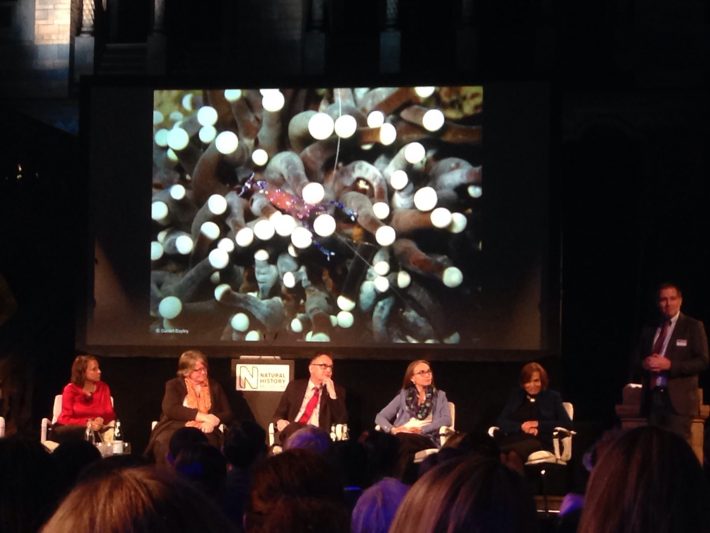Glimmers of hope for the oceans
The Natural History Museum’s 2017 Annual Science Lecture on 28th November was given by Dr Sylvia Earle, and focussed on the urgent need to protect our oceans before it is too late for their inhabitants.

Dr Sylvia Earle, marine biologist and advocate for marine conservation, gave a compelling lecture on the future of the oceans. This was followed by a panel discussion with Dr Thérèse Coffey MP, Parliamentary Under Secretary of State Defra, Simon Reddy of the Pew Bertarelli Ocean Legacy Project, Professor Samantha Joye of the University of Georgia and Dr Ana Riesgo Gil, of the NHM.
The evening began with an announcement that the NHM would be halting its use of single-use plastics within the next few months.
Dr Earle’s lecture focussed on the importance of the oceans for human life; ‘what we take from the oceans is our existence’. She urged greater access to and awareness of the sea, particularly for the younger generation, in whose hands the future of the ocean lies.
In her own research, Dr Earle investigates the deep seas, and spoke about saline pools in the Gulf of Mexico. These ecosystems are almost entirely unknown and are home to many un-described species with unusual biochemistry, potentially having uses in medicine and biotechnology. Despite this potential, many deep sea creatures are now being over-harvested before much is known about their biology or the habitats in which they live.
Dr Earle’s hope for the future of the oceans is based on our knowledge. We now know more than any humans before about the Earth system and the impacts on it of our actions. She sees, in the current drive to reduce our reliance on single-use plastics and the increasing designation of marine protected areas, glimmers of hope that we may choose a different path.
In the shadow of ‘Hope’, the 4 tonne Blue Whale skeleton that now hangs in the NHM’s Hintze Hall, Dr Earle spoke about how close whales came to being exterminated by humans, but that a change of attitude and policies towards the magnificent creatures helped to prevent that. She hopes a similar change of heart will now happen towards the whole ocean system and its inhabitants.
The panel discussion that followed touched on subjects such as micro-plastics. Dr Coffey stated the Government’s commitment to this issue, saying that a micro-beads ban will be in place from July of next year. She emphasised the need to work with industry and other countries’ governments to reduce plastics pollution. The need for a circular economy for plastics (giving waste plastic an economic value, therefore keeping it from being discarded) was highlighted by Simon Reddy.
The panelists finished by outlining their hopes for the future. Dr Rieso Gil said that she sees the huge scientific advances being made in marine science as her main source of hope, and Professor Joye stated that the enthusiasm of young people is what gives her hope that the oceans of the future will be sanctuaries, not graveyards, for our marine biodiversity.
Check out #NoBlueNoGreen on Twitter for Tweets about the event, and follow @BESPolicy for more science and environment related policy updates.
Like what we stand for?
Support our mission and help develop the next generation of ecologists by donating to the British Ecological Society.